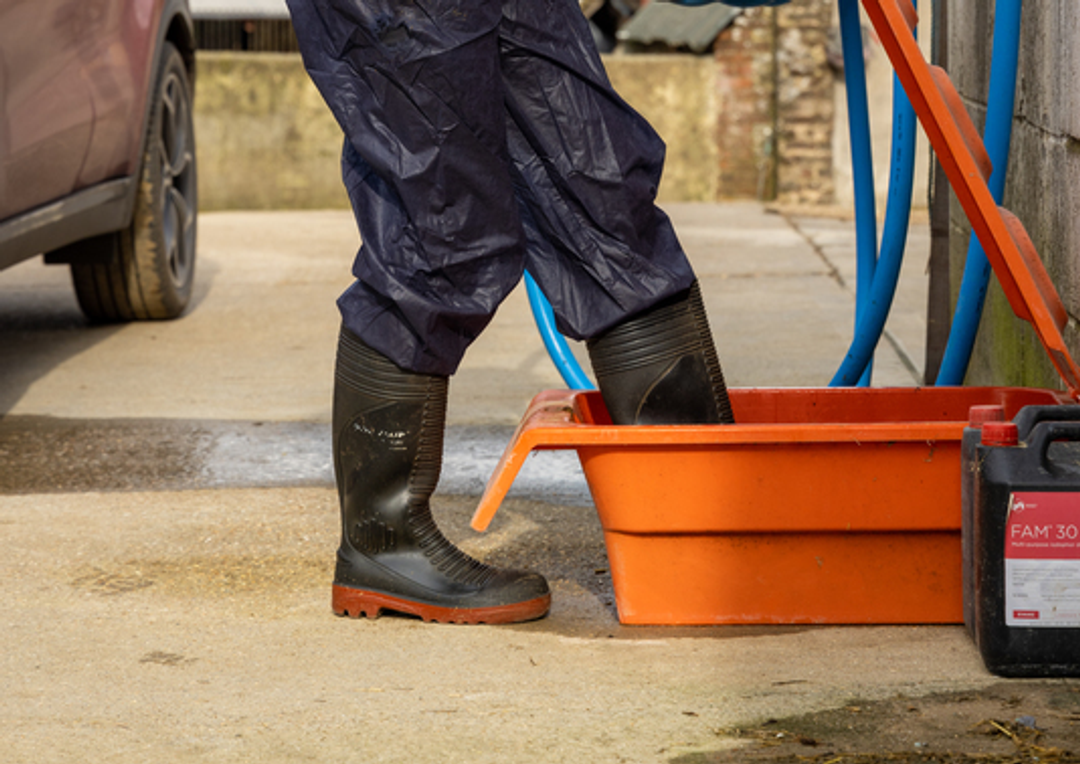Essential biosecurity practices for UK farmers

With the threat of evolving disease present, maintaining effective biosecurity is essential to safeguarding your livestock and the financial viability of your farm.
Robust biosecurity measures are necessary to protect your animals from potential illnesses.
We want to support our members and all UK farmers through these difficult times, so let's explore some practical strategies to elevate farm biosecurity.
Prevent contamination
Prevention is the most effective method of controlling contamination. Consider how infections could make their way onto your farm and take precautions to prevent them. These measures serve as your first line of defence.
- Pathogens can be carried in via foot traffic, on vehicles, on contaminated equipment, and even by wild animals.
- Implement strategic foot dips, designate clean and dirty zones, and establish clear visitor protocols.
- Maintain rigorous cleaning regimens for housing, equipment, and even clothing.
Control farm access and keep thorough records
- Visitors: Ensure all visitors, whether official visitors or family and friends, observe your biosecurity protocols
- Maintain accurate records: A thorough visitor log makes effective contact tracing possible.
- Vehicle vigilance: Designate parking areas away from animal zones. When feasible or necessary, implement tyre washes.
- Equipment control: Avoid sharing equipment if possible and follow strict cleaning and quarantine procedures when it isn’t.
Stay up to date with what’s going on
- Keep an eye on UK websites like APHA, Defra UK, the Welsh Government, the Scottish Government, the Dept of Agriculture, Food and the Marine, and the Department of Agriculture, Environment and Rural Affairs of Northern Ireland.
- Create a biosecurity plan with tailored protection strategies. This might best be done in collaboration with a vet or other qualified professional.
- Ensure everyone on your farms is familiar with your protocols and empower them to enforce and maintain them.
Biosecurity and animal welfare
Healthy animals are more resilient to infection. Higher welfare standards and comprehensive biosecurity measures can go a long way to limiting risks.
- Lowering stress levels and enhancing well-being can lead to heightened disease resistance.
- Minimising infection reduces the need for antibiotic treatments.
- Robust biosecurity increases buyer confidence, making your livestock more valuable.
- Be aware of interspecies disease transmission
What you can do
Biosecurity is an ongoing commitment. Only by remaining vigilant and continuously improving your plan can you be sure you are doing everything you can to prevent infection. By integrating good biosecurity as a fundamental aspect of your farm, you will be doing all you can for yourself, your business and your animals.
Farm biosecurity checklist
Emergency preparedness
- Write an emergency response plan
- Regularly update your plan
- Ensure all employees and visitors are familiar with the plan
- Test your plan
Animal health
- Routine inspection for initial signs of illness
- Isolating any sick animals promptly
- Dispose of any deceased animals properly
- Quarantine procedures for new animals
- Maintain gates and fences
Visitors and employees
- Regular training on biosecurity protocols for employees
- Document all training records
- All visitors must be aware of biosecurity protocols
- Required protective clothing and footwear must be worn
- Handwashing before and after handling animals, if possible
- Restricted access to animal housing areas
- Keep access routes and parking areas clean
Equipment and vehicles
- Cleaned and disinfected between each use
- Stored in a clean and dry place
Monday 6 October 2025